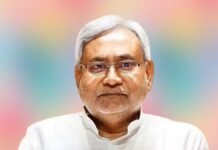
Chennai: MS Swaminathan, the eminent agricultural scientist who transformed India’s food security and agricultural productivity, passed away on Thursday morning in Chennai at the age of 98. He was suffering from age-related ailments and was undergoing treatment at a hospital. He is survived by his wife Meena, who is also an environmental activist, and three daughters Soumya, Madhura, and Nitya, who are all accomplished professionals in various fields.
Swaminathan was born on August 7, 1925, in Kumbakonam, Tamil Nadu. He studied medicine, botany, and genetics at various universities in India and abroad. He switched his focus to agriculture after witnessing the devastating Bengal famine of 1943, which killed millions of people due to starvation.
Swaminathan is widely regarded as the main architect of the Green Revolution in India, which averted a famine-like situation in the 1960s by introducing and developing high-yielding varieties of wheat and rice. He collaborated with Nobel laureate Norman Borlaug and other scientists to bring about a quantum leap in India’s food production and self-sufficiency. He also pioneered the concept of sustainable agriculture, which balances the needs of ecology and the economy.
Swaminathan held several prestigious positions in national and international institutions related to agriculture, science, and the environment. He was the director of the Indian Agricultural Research Institute (IARI) from 1961 to 1972, where he led the research on wheat improvement. He was the director general of the Indian Council of Agricultural Research (ICAR) and the secretary of the Department of Agricultural Research and Education (DARE) from 1972 to 1979, where he oversaw the expansion and diversification of agricultural research in India. He was the principal secretary of the Ministry of Agriculture from 1979 to 1980, where he formulated policies for agricultural development and rural welfare.
He also served as the director general of the International Rice Research Institute (IRRI) in the Philippines from 1982 to 1988, where he initiated the genetic conservation and improvement of rice varieties. He was the president of the International Union for Conservation of Nature (IUCN) from 1988 to 1990, where he promoted the integration of conservation and development. He was also a member of parliament (Rajya Sabha) from 2007 to 2013, where he advocated for farmers’ rights and welfare.
Swaminathan received numerous awards and honors for his outstanding contribution to agriculture and humanity. He was awarded the Padma Shri in 1967, the Padma Bhushan in 1972, and the Padma Vibhushan in 1989 by the Government of India. He was also conferred with the Ramon Magsaysay Award in 1971, the Albert Einstein World Science Award in 1986, and the World Food Prize in 1987 by various international organizations. He was named one of the most influential Asians of the 20th century by Time magazine in 1999.

Swaminathan founded the MS Swaminathan Research Foundation (MSSRF) in 1988, which is a non-profit organization dedicated to improving the lives and livelihoods of rural people through participatory research, education, and action. He also chaired the National Commission on Farmers (NCF) in 2004, which made comprehensive recommendations for enhancing India’s farming system and addressing farmers’ distress.
Swaminathan was a visionary leader who inspired generations of scientists, farmers, and policymakers with his passion and wisdom. He will be remembered as a legend who changed the course of India’s history and destiny through his scientific innovations and humanitarian values.







































